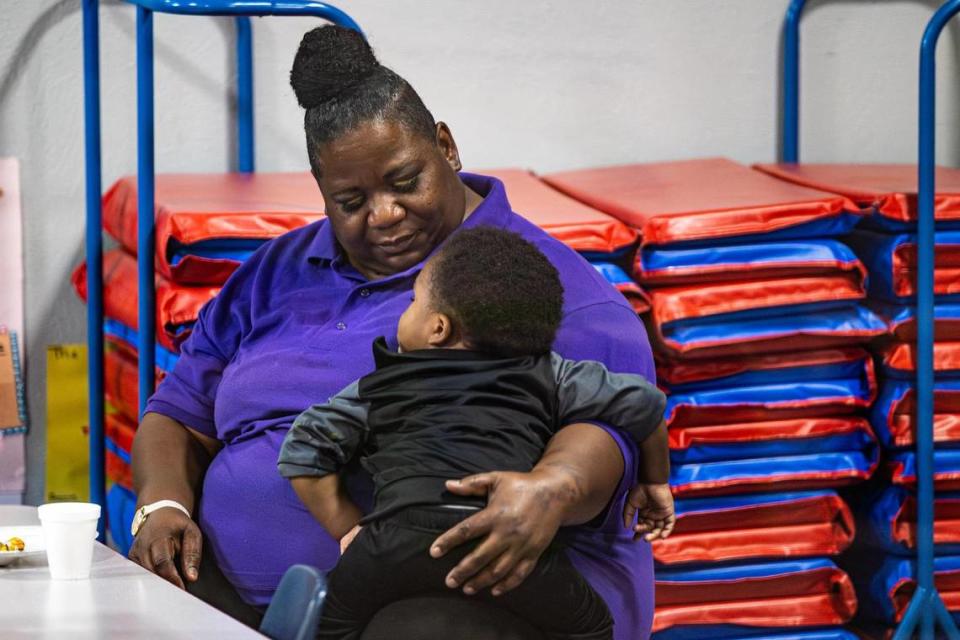As child care hangs by a thread, new Tarrant County pilot program seeks long-term solution
The Sunrise Early Learning and Development Center was peaceful Thursday morning, as infants slept soundly in one classroom while toddlers enjoyed lunch in another. Faces were smiling and stomachs were full.
Older children would be coming later in the day, reaching a total of 45 if there were no absences. But this enrollment is about a 37% decrease from the center’s capacity of 71, which was reached before COVID-19. Declined enrollment is one of multiple obstacles that child care providers are facing as the sector stands on shaky financial footing, but a local pilot program providing aid to centers like Sunrise could yield a more stable, long-term business model, in addition to increased enrollment.
Sunrise is one of 20 early childhood centers and homes in Tarrant County taking part in a pilot program that increases early educator wages, offsets operational costs and ensures access to infant and toddler care, among other priorities. The initiative spearheaded by Child Care Associates, one of the largest child development programs in North Texas, tests a new funding structure aimed at providing quality child care without increasing costs to parents.
Angela James, who’s operated the Sunrise center since 2019, said although the financial support has been a big help, it’s also provided training for staff.
“Child care as a whole is struggling right now, but I thank God for it (the pilot),” James told the Star-Telegram. “Especially yesterday, I looked at financials. If it wasn’t for the pilot, oof. We would be in trouble right now.”

Participating providers in the pilot must meet certain service requirements and quality standards that are associated with positive outcomes. Over the past year, providers have been prepped for the reporting expectations of the pilot while Child Care Associates has studied their business operations. On Oct. 1, providers started receiving the monetary support, which will be available until September 2024.
The $15-million program, funded by American Rescue Plan money from Tarrant County, comes at a time when funding for the child care sector is at a crossroads. Providers nationwide received billions of dollars in federal relief money when COVID-19 impacts hit, which kept many providers afloat that were struggling even before the pandemic. But the federal money ran out on Sept. 30, and an additional $1 billion in state money runs out at the end of November.
Today's top stories:
→ UAW reaches deal with Ford, but GM Arlington strike goes on
→ Will Dallas-Fort Worth see freezing temps this weekend?
→ Fired Tri-County Electric CEO sues board; CFO alleges he paid himself $50K
🚨Get free alerts when news breaks.
Kara Waddell, CEO of Child Care Associates, said she’s frequently asked about the cost it takes to run a high-quality early learning program, but the answer is different between a center and a home and depends on factors such as the program’s size and the ages of the children the program serves.
“We’re using what we know from research and data and bringing in economists from day one, so that we can try to get to that number,” Waddell said. “It’s going to be 2025 when we should begin to have some initial data out as well as recommendations for policymakers on where do we go from here.”

Flávio Cunha, a professor of economics at Rice University overseeing the pilot, emphasizes that money alone won’t solve the problem, but a new business model that utilizes multiple tools could be a solution.
“Restructuring the financial model may actually make it much cheaper for us to attain the four things that we want to have (in child care): We want it to be accessible; we want it to be high quality; we want teachers to have a living wage; and we want the child care programs to not be so financially fragile as they are,” Cunha told the Star-Telegram.
A focal point of the pilot is early educator wages, which were raised from about $12 an hour to $18 an hour. A general obstacle providers face is giving competitive pay to staff, but, according to Cunha, 70% of expenditures already go toward payroll with providers seeing 1-2% profit margins.
At a Child Care Associates luncheon on Oct. 11, Cunha discussed the program alongside Felicia Davis, owner of Ready Set Jump Learning Center in east Fort Worth. Davis said she retains staff for an average of five months after they undergo background checks and complete training and certifications, such as CPR, which takes about 90 days.
“We’re losing them left and right,” Davis said, adding that they go to higher-paying jobs at Amazon or local school districts. “It’s about five months, and they’re gone.”
But Davis noted how being part of the pilot program has already benefited staff, as one of her teachers was excited about being able to buy new tires for her car. Overall, it’s improved morale as well.
“It’s really changed the child care center a lot,” Davis said.

What other research in Texas and nationwide shows
A 2023 report, conducted by researchers at the University of Texas at Austin, that analyzes the cost of providing quality child care in Texas revealed price gaps between nationally-accredited and state-certified centers versus their non-accredited and non-certified counterparts.
The price of quality care for younger children was 18-26% higher this year at nationally-accredited centers compared to non-accredited centers that simply meet licensing standards, the report states. Additionally, the price of care for young children at Four-Star Texas Rising Star facilities this year was 10-15% higher compared to non-certified centers.
The Four-Star certification is the highest one a center can earn in the Texas Rising Star Program, which is the state’s quality rating and improvement system for child care programs.

Additionally, annual market rate surveys have shown that child care prices vary by location with the most expensive care being in major metropolitan areas where higher wages are given, said Daniel Schroeder, a research scientist at UTA’s Ray Marshall Center for the Study of Human Resources who contributed to the report. Dallas and the Dallas suburbs used to have the most expensive child care statewide about 10 years ago but have since been surpassed by Austin.
Possible solutions to making quality care more accessible to low-income families include utilizing federal programs, such as the Child and Adult Care Food Program, which provides meals and snacks to eligible children and adults in child care or adult care programs. But overall, more federal funding is a necessity.
“Federal funding for child care is desperately needed. The way I see it, the only thing that can save child care is a big federal program,” Schroeder told the Star-Telegram.
Some states outside of Texas have utilized ARPA money to implement policies aimed at mending the broken model of the child care system, with a focus on educators. A brief published in February by the Center for the Study of Child Care Employment at the University of California, Berkeley notes that Washington state started covering healthcare premiums for staff of licensed facilities, while Kentucky created automatic eligibility for child care subsidies of certain child care workers.

In North Carolina, a collaborative created a salary scale alongside funding for better pay and benefits to educators. Salary scales can be a useful guide, but money is needed to apply them to the real world.
“It can be a helpful tool to set benchmarks or standards that are defined. However, without public funding for programs to implement it, programs are often unable to achieve those aspirational wages,” Annie Dade, policy analyst at the Center for the Study of Child Care Employment who co-wrote the brief, said in an email. “If they don’t have the ability to fund raise philanthropic dollars, or apply to varied/cumbersome grant programs, then they’re left with the option of raising parent fees (which isn’t sustainable or equitable given the cost burden of child care for families).”

